What Emergence From COVID Lockdown May Hold for Child Psychological Development
"To get child care back up and running, governments must find ways to bring employees back to the sector."
"This means addressing the problem of low wages and inadequate compensation, and putting in place special funding to make sure that child care facilities are safe for both children and staff."
Don Giesbrecht, chief executive officer, Canadian Child Care Federation
"Children who were isolated or quarantined during pandemic diseases were more likely to develop acute stress disorder, adjustment disorder and grief."
"Thirty percent of the children who were isolated or quarantined met the clinical criteria for post-traumatic stress disorder. Furthermore, separation from parents or parental loss during childhood also has long-term adverse effects on mental health, including a higher risk of developing mood disorders and psychosis, and 'death by suicide' in adulthood."
"Adults need to be vigilant that children are not inappropriately blaming themselves or feeling that the illness is a punishment for previous bad behaviour."
The Lancet Child & Adolescent Health
 |
Amparo Aguilera puts a protective face mask on her grandchild Kilian in Igualada, Spain April 26, 2020
Image: REUTERS/Nacho Doce - RC2GCG90NK6P
|
Children are sensitive to dangers impacting on their family, threatening their security with their guardian parents, and they can be sensitive to unspoken fears that communicate to their comprehension of a total turn-about in the way their world has operated to the present. All the old familiar routines were to be abandoned, and new ones take their place, more rigid, protective, alien to their familiar way of life; claustrophobic in type and character.
And if those children are within a family unit further stressed by a lack of employment, of tight physical living conditions, of food shortage, and short-tempered parents stressed to the limit, an overwhelming sense of insecurity and fear for the future tempers their discomfort with the new reality. Child anxiety, depression, loneliness and despair are the perfect breeding grounds for mental illness.
 |
| Photograph: Photofusion/REX/Shutterstock |
Kids Help Phone reported that in the early lockdown period the service reported a 350 percent increase in calls received by the national help line geared toward responding to children's needs. Each day an average of 2,000 calls, texts and chats were anticipated from young people in the ongoing lockdown; children who were looking for explanations, for empathy, for reassurance that all would turn out well.
A Spanish survey reported that close to nine in ten parents had noticed alterations in their children's expressed emotions and behaviours, with many suffering concentration difficulties, irritability and profound anxiety. In Canada, 72 percent of child care centres closed, making living arrangements more acute for parents, unprepared to look after their children full-time.
Clinical psychologists in the United Kingdom published some useful advice for parents in The Lancet Child & Adolescent Health, urging parents to be aware their children needed appropriate, age-centric information about the pandemic; to consider that between the ages of four and seven, children develop a sense of conscience, at the same time they have a poor understanding of the science of disease.
"Loneliness that may result from disease containment measures in the COVID-19 context could be associated with subsequent mental health problems in young people."
"Children and adolescents are probably more likely to experience high rates of depression and probably anxiety during and after enforced isolation ends."
"This may increase as enforced isolation continues. Clinical services should offer preventative support and early intervention where possible and be prepared for an increase in mental health problems."
British researchers, large-scale meta-analysis
 |
| The truth is children’s lives are not really back to normal, and will not be for some time.’ A member of staff takes a child’s temperature at the Harris primary academy Shortlands, London, on 4 June. Photograph: Dan Kitwood/Getty Image |
Labels: Anxiety, COVID and Children, COVID Lockdown, Depression, Mental Health, Stress

0 Comments:
Post a Comment
<< Home